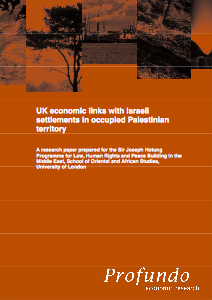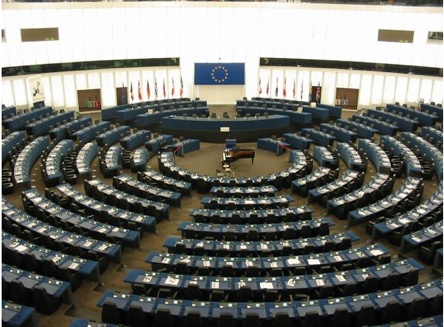The EU & Israel
With a Focus on the UK

The EU & Israel
With a Focus on the UK

War on Want


‘On the main issues – chiefly its refusal to engage with Hamas; its failure to honour its legal obligations and oppose Israeli crimes with anything more than words; and its unwillingness to publicly pressure the US to join the international consensus in calling for a genuine two-state settlement – the EU’s position remains dreadful. … Currently the main role of the EU, through, for example, its membership in the US-dominated ‘Quartet’, is to provide Washington cover as it facilitates Israeli rejectionism and subverts Palestinian self-determination. The EU is a very important trading partner for Israel and has the capacity to bring considerable pressure to bear on the Israeli government.’
‘Is EU policy towards Israel shifting?’ The Heathlander, 06.08.08
The form which this section takes is basically that of a portal for people interested in learning about the web of relationships which binds the EU (and more specifically the UK) to Israel. Hence there are multiple references to further sites. To a greater extent than is the case in other sections of this website, this section contains a mass of complex material. Though not absent, commentary on this material is fairly minimal: the material speaks for itself. While the author has taken considerable care to get the section as accurate as possible, she would greatly appreciate any feedback as to perceived inaccuracy or significant updates. Also the EU re-jigs its website, which may result in broken links.
The complexity of the material not withstanding, the broad lines as to what needs to be said seem obvious and a few general points will be made here.
•The EU (and within that context the UK, with which we shall be specifically concerned) is involved in a multi-facetted network of trade, cultural, security, military and academic links with Israel. These arrangements are entered into by governments and by the institutions of the EU, it may safely be assumed with little public awareness of what is undertaken on their behalf. Large sums of money are involved.
•Most of the agreements and accords have built into them exemplary statements as to the human rights and values, forming the presuppositions in which these accords are grounded. Israel was in clear violation of these at the point when these documents were signed and this continues to be the case. There have been some moves by the EU Parliament and many by pressure groups, in Israel as well as in the EU, pointing to this state of affairs.
•It would seem that what lies behind the fact that nothing (or nothing substantial) is done to draw out the consequences of this or face this anomaly is military, security and economic advantage. In this Israel is treated quite differently than the way in which other non-EU states have been treated. Israel is sufficiently dependent on its relations with the EU that, were it so minded, the EU could pull the plug on Israel on account of its bad behaviour.
It would be very useful if:
•There were much clearer statements available on this whole area, based on intensive research and analysis.
•The many groups and individuals concerned about what is happening in Israel and the OPT were better informed.
•The EU Council and Commission were to be more accountable to a stronger EU Parliament.
•The right-wing Jewish lobby in the UK and elsewhere in Europe were not so pervasive and those who wish to work for human rights were more organised.
We are however up against deeply entrenched economic and military interests. It will take a humanitarian outcry and a major BDS (boycott, divestment and sanctions) movement if the EU (and British Government) is to be forced to conform to its own proclaimed principles. In this regard we should note the outstanding work being undertaken by the Russell Tribunal on Palestine.
Wikipedia Commons: Cédric Puisney
The European Parliament, Strasbourg

‘Why is Israel being treated with kid gloves by our governments? Privately, Brussels officials say that the EU needs to be on good terms with Israel because it is the kind of hi-tech economy that they wish Europe to emulate. The same officials are less willing to recognise that many of the Israeli innovations they profess to admire were developed through cruel experiments in which the Palestinian people were treated as lab rats.
Israel is the leading foreign participant in the EU’s multi-annual “framework programme” for scientific research, which has been allocated €53 billion (£44.2billion) between 2007 and 2013. Among the Israeli firms pocketing EU grants are Elbit and Israel Aerospace Industries, the manufacturers of pilotless drones that were used to inflict terror on civilians during Israel’s three-week bombardment of Gaza...
Under the terms of an “association agreement” with Israel that came into effect in 2000, the EU is legally obliged to sanction Israel for systematic abuses of human rights. Not only has the Union refused to honour that commitment, it is actively supporting the arms companies that profit from the murder of innocents. it is no exaggeration to conclude that the EU has become an accomplice to genocide.’
David Cronin, author of Europe’s Alliance with Israel: Aiding the Occupation (Pluto Books, Nov. 2010)
There are the following web pages in this section of this site. I give also the sub-headings in these pages.
The E.U. and Israel
The EU-Israel Association Agreement
The Euro-Med Partnership
(‘Barcelona’ Declaration)
The EU-Israel Action Plan, 2005-2010
The European Neighbourhood Policy
Possible Up-grade of Assoc.Agreement
(Protocol of Co-operation)
European Parliament
The Russell Tribunal on Palestine
Pressure coming from within the UK
The Labelling of Goods
Israeli Membership of the EU unlikely
Figures for Exports
Codes of Conduct
Questions Asked (UK)
The United States
NATO – Israel Anti-Terror Co-operation
The EU Framework Programme for Research
& Technical Development
The European Research Area (ERA)
Industrial Research & Development Agreement
BIREX
Foreign Investment in Israel
Note on Parliaments: EU and UK
The European Union
Swedish Presidency
Catherine Ashton
EU-Israeli Working Group on Human Rights
(TROIKA)
Websites of the Foreign and Commonwealth Office and subsidiaries
What the UK has omitted to do
Party, Cross Party and other Political Groups
The Conservative Party
The Labour Party
The Britain-Palestine All-Party Parliamentary Group
The Council for Arab-British
Understanding

Wikimedia Commons
Baroness Catherine (Cathy) Ashton
EU High Representative for Foreign Affairs and Security Policy
See Further on this Site:
The Present Impasse, Europe